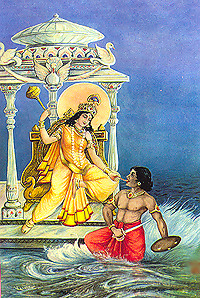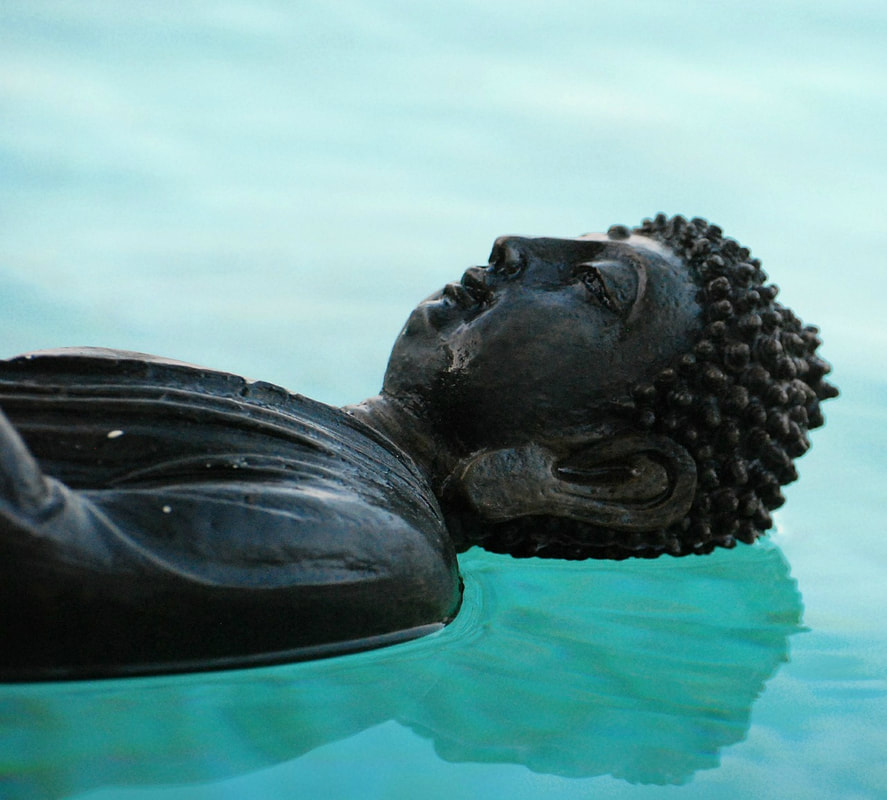 Dressed all in yellow, Goddess Bagalamukhi sits on a golden throne surrounded by yellow lotuses. But don't let that pretty image fool you. She is one of the ten wisdom goddesses and she is usually depicted grasping the tongue of a demon and using her club to nail the tongue down. She is also sometimes seen sitting on a corpse... a male corpse. Do not lie to her; she is the goddess of supreme speech. She teaches that with wisdom of speech we can virtually paralyze our enemies. But what does she have to teach if your own enemy is, well, you? Remember that the Yoga Sutras explain that we create our own suffering in the re-telling of stories in our head. We all have memories attached to regret or remorse or sadness. Often times, we replay those stories starting each sentence with "what if". "What if" I had done this instead? "What if" I had been more understanding? What if??? Bagalamuhki, when not wielding a club, offers blessings with that hand while holding onto the liar's tongue with her other. The ego, in helping us re-tell these stories, is the liar. She prompts us to stomp on that deceiving voice and to restore the truthful stories in our head. What if you are saying but my story is a truthful story in my head! If I had made a different choice, what ensued would never have happened? I would have to respond with do you choose to live in your own suffering? The past cannot be changed and the present, however we got here, is what is. Take a deep breath and choose to let it go. The Sanskrit word Bagalamukhi has a few translations. Bagala means bridle and mukhi means face. Picture a bridle on a horse. The bridle is attached to the bit; the metal piece that goes in the horse's mouth and rests on his tongue. The bit serves to control the horse's movements. This is a good image to dwell upon when untruths are about to spill out of your mouth, whether directed towards you or someone else. Another translation of her name is "the crane-headed goddess". "There is a Japanese idiom that translates into, “one word from the crane’, meaning the “voice of authority”, the one who has the final word that isn’t challenged." (Jenny Nakao Hones) Bagalamukhi is a force to be reckoned with as is what she doles out to those who are not truthful. A crane has a very long neck and another aspect of symbolism to her name may just be in the distance between the heart and head. While our mind may reconcile a memory, our heart seems to take a bit longer. But does this leave us paralyzed in our past until the heart center catches up? Bagalamukhi is also referred to as “the paralyzer.” When she nails down the tongues of those who are deceitful they are said to become paralyzed or at least their words are. They certainly aren't free in movement anymore! Goddess Bagalamukhi denotes duality; having two parts with opposite meaning. Evil speech is rewarded by her with silence. Those who follow her find their defeats become victories. Her duality can work in both directions, positive and negative. Each deity has mythology attached to him or her explaining their own creation. As legend has it, there was once a tremendous storm on earth and the Gods were fearful it would destroy everything and everyone. The Gods held a meeting to discuss how to weaken the raging storm. Goddess Bagalamukhi appeared and she is the one who manages to calm the storm. So, when the ego stories kick in and begin to torment your thoughts, heart and mind, dig deep, stand tall and use your own powers to calm the storm.
0 Comments
Leave a Reply. |
Archives
March 2024
|

 RSS Feed
RSS Feed